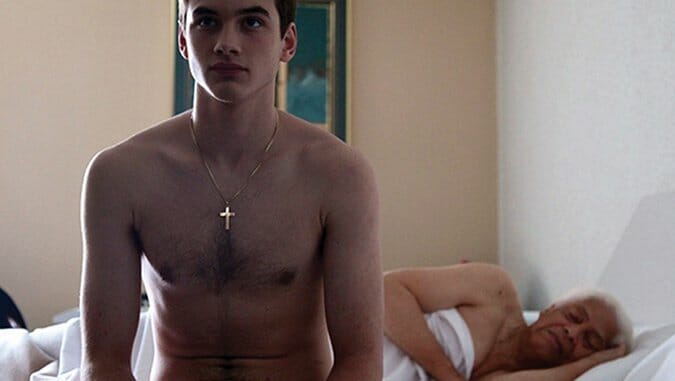Gerontophilia

Give or take an “FLQ BBQ” tee-shirt, director Bruce LaBruce’s Gerontophilia seems more interested in being arch about controversy than deliberately provocative. Main character Lake (Pier-Gabriel Lajoie) meets and falls in love with Melvyn Peabody (Walter Borden), an 81-year-old man who lives at the assisted living home where he works. The strangest image in the film is a fantasy where Lake imagines himself, lit up by a strobe, licking the sore-infested flesh of Melvyn’s back. It’s a vampiric allusion that seems out of place—perhaps there were supposed to be more fantasy sequences but the rest of them were cut? Possibly because almost every actor in this film takes three times longer than necessary to say lines? Gerontophilia: a master class in the absent-minded pause.
The cue-card listlessness of the dialogue makes it hard to love anything here; the bland story doesn’t help. LaBruce—an underground filmmaker, writer and actor based out of Toronto, most known for transgressing independent cinema by blending it with pornography—has suggested that Gerontophilia is his attempt to reach out to more mainstream audiences; for some reason the way this impulse manifests is that the story of Lake coming to terms with his love for older men closely parallels a fairly typical film dramatization of coming out. Of course coming out stories—even the relatively large amount of stories about men coming out as gay—are still hugely underrepresented in media. With that said, it’s hard not to think that this coming out story was deliberately framed within the beats of a story with which audiences are already somewhat familiar—and to which they know how to respond—to resist ageist reactions. Which isn’t a problem in and of itself; it’s just…everything here becomes formula, and outside of the gerontophilia of it all, LaBruce isn’t adding anything to the narrative. And because Lajoie (the audience surrogate who is supposed to be going through this experience) gives such a bland performance, disinterest sets in long before the film cuts to the political chase about whether or not you think 60 or so years is too large a gap for love to blossom.
-

-

-

-

-

-

-

-

-

-

-

-

-

-

-

-

-

-

-

-

-

-

-

-

-

-

-

-

-

-

-

-

-

-

-

-

-

-

-

-








































